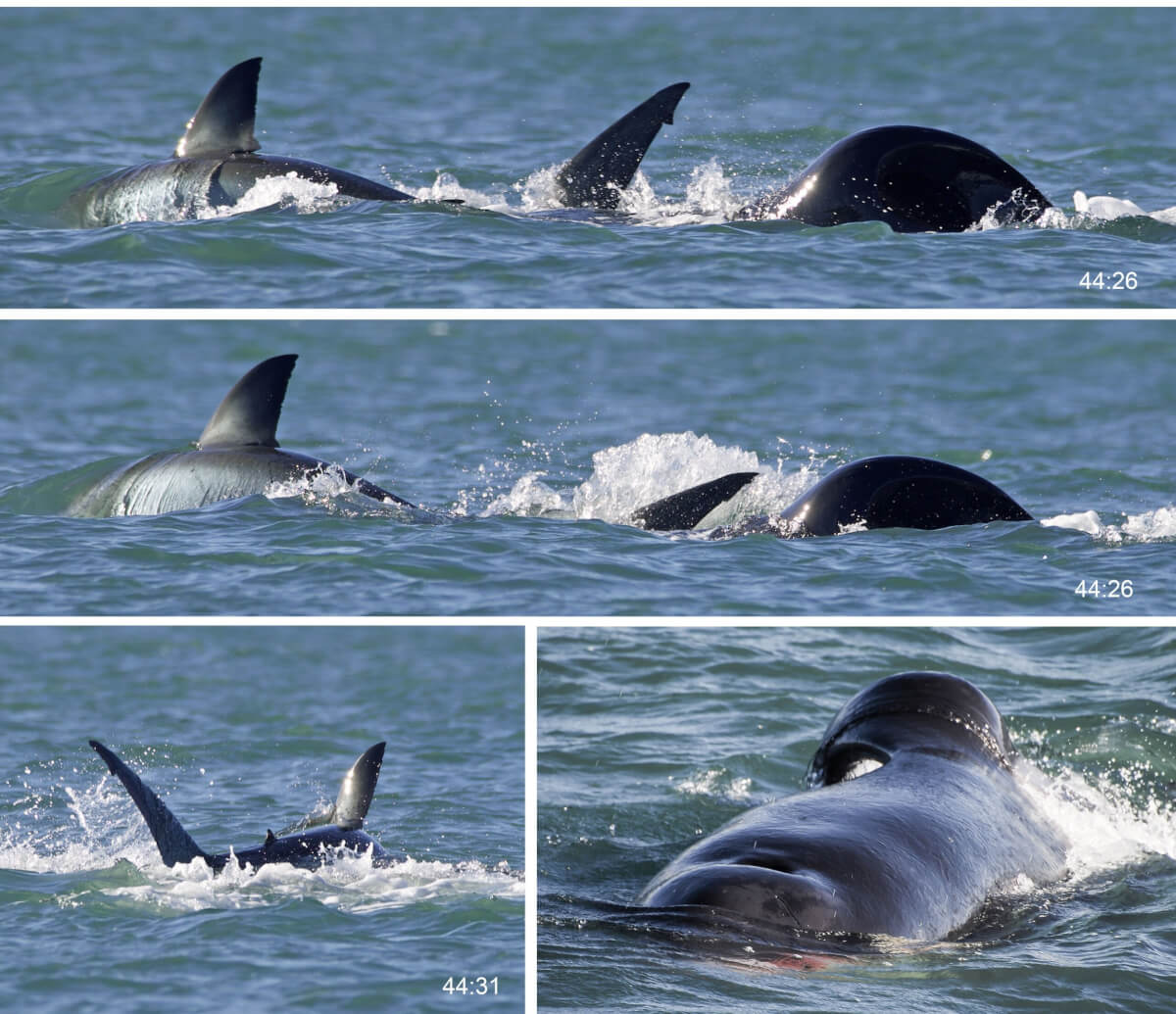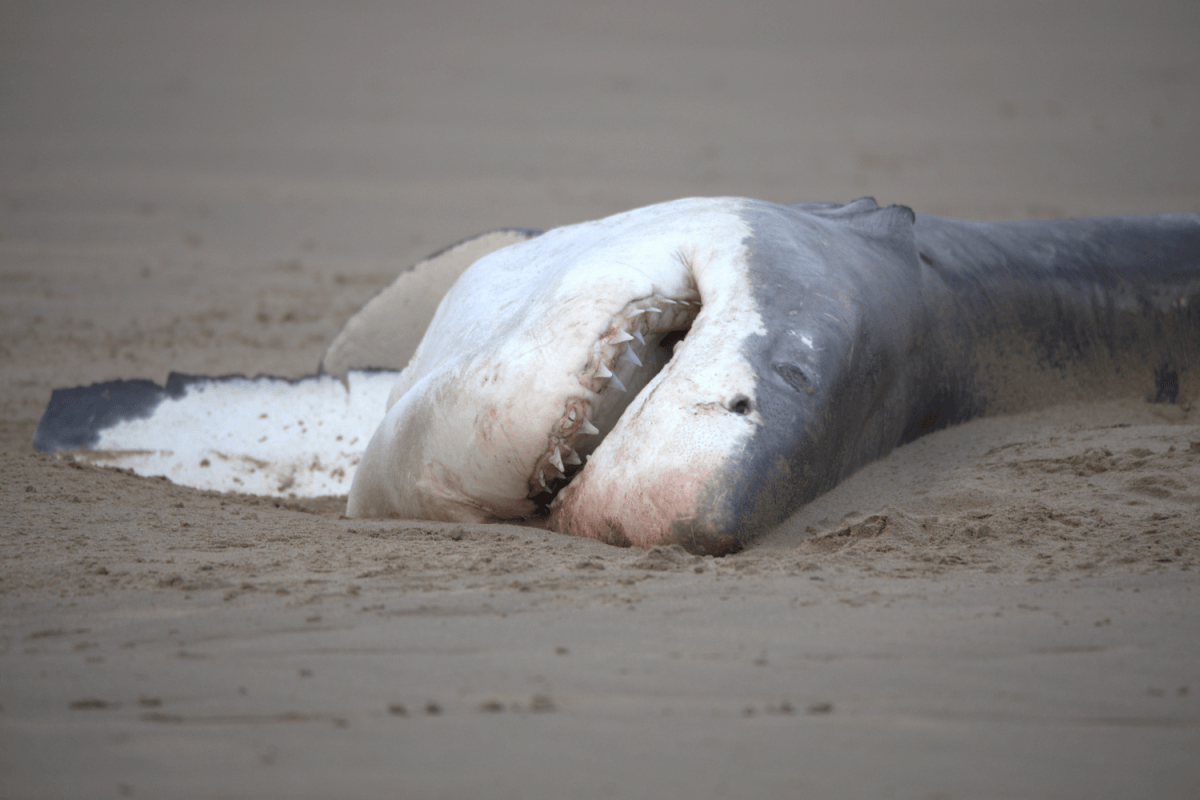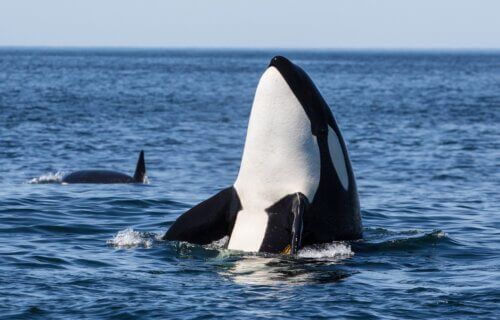MOSSEL BAY, South Africa — The hunted has now become the hunter. For the first time ever, a single killer whale was seen hunting and consuming a great white shark off the coast of Mossel Bay, South Africa.
Study author Dr. Alison Towner, a marine biologist from Rhodes University, led the international research team that made this astonishing discovery. Their findings provide new insights into the predatory behaviors of killer whales, challenging previous understandings of these majestic creatures.

Killer whales are known for their intelligence and cooperative hunting strategies, typically working in groups to take down large prey such as sea lions, seals, and occasionally sharks. However, the recent observation of a killer whale, affectionately nicknamed Starboard due to his distinctive collapsed dorsal fin, taking on a great white shark alone and succeeding in just two minutes, is unprecedented.
“Again, as previously in South Africa, the orcas are exhibiting a strong preference for extracting and consuming the lipid-rich livers of white sharks — a specialized feeding behavior,” says Dr. Towner, who has studied great white sharks for the last 17 years, learning about their movement patterns through tagging data, in a media release.
“But what we witnessed was an orca, nicknamed Starboard — due to his collapsed dorsal fin — performing alone to incapacitate and consume a white shark within an astounding two-minute timeframe.”
Orcas off the South African coast have shown a particular interest in the great white sharks since 2017. Not only do they hunt these apex predators, but they also exhibit a specialized feeding behavior by extracting and consuming the sharks’ lipid-rich livers.

The incident involving Starboard is a testament to the individual hunting capability of killer whales. Starboard was observed attacking a 2.5-meter juvenile white shark, efficiently incapacitating it and carrying its liver past a boat filled with observers. This solitary hunting behavior challenges the conventional belief that killer whales only hunt cooperatively in the region.
Moreover, the study raises important questions about the impact of killer whale predation on shark populations in South Africa. The displacement of sharks due to the presence of killer whales could lead to significant changes in the marine ecosystem, including the potential for mesopredator release — a phenomenon where the removal of top predators leads to an increase in the populations of smaller predators.
“The observations reported here add more layers to the fascinating story of these two killer whales and their capabilities,” explains Dr. Simon Elwen, founding director and principal scientist at Sea Search Research & Conservation and at the Department of BotZoo at the University of Stellenbosch. “As smart, top predators, killer whales can rapidly learn new hunting techniques on their own or from others, so monitoring and understanding the behaviors used here and by other killer whales in South Africa is an important part of helping us understand more about these animals.”
The research team’s findings underscore the importance of adaptable conservation strategies and vigilant ecological monitoring amidst changing environmental conditions. Citizen science, involving land-based observers, tourists on vessels, and collaborating institutions, played a pivotal role in capturing the crucial data and footage of this predation event.
Witnesses to the event expressed both awe and concern at the sight of Starboard’s hunting prowess.

“Witnessing a white shark’s fin break the surface initially sparked excitement, but that turned to a somber realization as Starboard swiftly approached,” says Esther Jacobs, from marine conservation initiative Keep Fin Alive. “The moment Starboard rapidly preyed on my favorite shark species was both devastating and intensely powerful.”
Study co-author Dr. Primo Micarelli, from the Shark Studies Centre and Siena University, adds, “Despite my awe for these predators, I’m increasingly concerned about the coastal marine ecology balance.”
This remarkable observation of a killer whale hunting a great white shark alone offers profound insights into the adaptability and ecological impact of these majestic marine predators. The findings represent a significant contribution to global understanding of marine ecosystems and predator-prey relationships, emphasizing the dynamic nature of these interactions and the need for continued study and conservation efforts.
The study is published in the African Journal of Marine Science.
